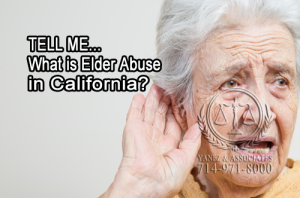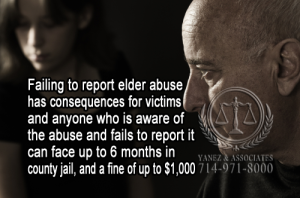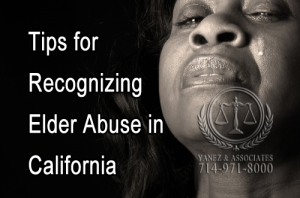Learn about Reporting Elder Abuse in California
In California, people over 65 years old are considered elders. It is important that you understand how to recognize elder abuse, how to report elder abuse, and the potential consequences of failing to report it.
What is Elder Abuse in California?

Most elders do not know what is considered Elder Abuse in California; moreover, the general population is also clueless.
Elder abuse can be either criminal or civil. Criminal law deals with punishing people who break the law, while civil law deals with private matters between two members of the public, when one has wronged another.
• The person is aware that another person is an elder; AND
• The person willfully causes or allows the elder person to suffer; OR
• The person willfully causes or allows unjustifiable physical pain to the elder person; OR
• The person willfully causes or allows mental suffering to the elder person; OR
• The person willfully causes or allows the elder to be placed in a situation that endangers the elder person’s health.
Civil elder abuse in California constitutes various types of physical abuse, financial abuse, neglect, abandonment, isolation, or other actions that may lead to physical or mental pain or suffering. These types of abuse are defined below.
• Physical Abuse - Causing physical pain, causing injury, sexually assaulting, molesting, or using physical or chemical restraints for punishment either without a doctor's order or beyond what the doctor has ordered.
• Financial Abuse - Illegally or unethically using an elder’s funds, property, or assets.
• Verbal Abuse - Causing harm to a person with the use of words. This can consist of insulting, shaming, threatening, intimidating, demeaning, derogatory language, shouting as well as other forms of communication.
• Neglect - Failing to care for an elder by a person who has a responsibility to do so. This can include assisting in personal hygiene, providing basic needs like clothing, food, water, shelter or medical care, or protecting a person from health or safety hazards.
• Abandonment - Deserting an elder person by someone who was responsible for the elder’s care.
• Isolation - Intentionally causing the elder person to be out of contact through mail, phone calls, visitors, or internet use.
• Mental Pain or Suffering - Causing fear, confusion, agitation, or anxiety, threatening, or harassing the elder. This can be done through verbal assaults, threats, or intimidation, withholding emotional support, or causing emotional distress.
Tips for Recognizing Elder Abuse in California
As with domestic violence or other forms of abuse, the victim may do his or her best to try to hide the abuse, or the abuser could be manipulating the situation to make it difficult to recognize that abuse is taking place. Look for the following signs so you can recognize when abuse occurs and take the appropriate steps to stop it. The following do not necessarily mean that abuse has definitely occurred, but they may mean that you should investigate the situation further.
Physical signs that may indicate elder abuse in California can include the following:
• Poor skin condition or poor hygiene, from uncombed or matted hair to foul smells,
• Missing patches of hair, bleeding scalp, unexplained bruises or welts,
• Untreated medical conditions,
• Dirty, torn or bloody clothing or undergarments,
• Burns from ropes, scalding water, cigarettes, or other unusual sources,
• Other injuries from specific objects, like a belt, cord, or hand
• Injuries that don’t appear to match the explanations provided.
Behavioral signs that may indicate elder abuse in California can include the following:
• Acting withdrawn or frightened of people,
• Acting secretive, or being hesitant about talking about certain subjects or people, or the inability to speak freely without the caregiver being present,
• Depression,
• Confusion or extreme forgetfulness,
• Helplessness or unusual anger.
If you feel that an elder you know may be isolated or may have been abandoned by a caregiver, you may notice signs as well. If you have trouble getting in touch with the elder person, or if he or she has trouble seeing family, doctors, clergy or friends, the elder may be a victim of abuse.
Possible signs of financial abuse can be harder to spot, especially if only one person has access to the elder’s finances. However, signs can include the following:
• Unusual bank account activity, like withdrawals from ATMs that could not have been made by the elder person;
• Forged signatures on documents or checks;
• Documents or checks that have been supposedly signed by the elder when he or she does not have the mental capacity to do so;
• Unpaid bills when someone has been designated to pay bills;
• Unexplained changes in spending patterns or purchasing things that the elder cannot use;
• A new person in the elder’s life who initiates a close relationship and offers to help manage finances and assets.
Financial abuse can come from many sources, from telemarketers to door-to-door salespeople or home improvement scams to online identity theft.
Reporting Elder Abuse in California

Failing to report elder abuse has consequences for victims and anyone who is aware of the abuse and fails to report it can face up to 6 months in county jail, and a fine of up to $1,000
If you suspect elder abuse has occurred, whether to a loved one, a neighbor, or in a long-term care facility, it is critical you report it, even if you are not sure it has taken place. Without intervention, elder abuse can escalate and may continue to do so the longer the abuser believes he or she can get away with it. In some cases, reporting elder abuse can save the life of a victim.
Any person can report elder abuse.
Failing to report elder abuse not only has consequences for the victim, but anyone who is aware of the abuse and fails to report it can face up to six months in county jail, and a fine of up to $1,000.
In California, report elder abuse in a long-term care facility to your local Long-Term Care Ombudsman, your local law enforcement agency, or to the Bureau of Medi-Cal Fraud and Elder Abuse. Any of these offices can assist you.
If the abuse takes place outside of a long-term care facility, report it to your local Adult Protective Services agency, or to your local law enforcement agency. Every county in California has an Adult Protective Services agency.
Contact a California Elder Abuse Lawyer
In Summary: Reporting elder abuse in California is crucial. The reason it is crucial to report elder abuse in California, is due to the rise in the number of abuse cases reported. It is important to ensure that the quantity of elder abuse cases decrease and not increase. Moreover, it is important to provide the senior citizens with resources to protect themselves. In addition, it is important to provide resources to the individuals caring for the elderly.
Resources are available in most communities, though many do not know where they can access these resources. Many resources are offered at low costs, if not free of charge. There are even support groups to speak with other individuals who have gone through similar experiences. Support groups are available for the elderly, as well as the caregivers.
Caregivers may be under a lot of stress if the facilities they are working for are understaffed. It is important for the caregivers to have an outlet to relieve the stress they might be feeling and experiencing. Some tips may be to set aside some time for yourself, to relax. Relaxation activities will vary from individual to individual. For example, some may enjoy going for a walk, reading a book, or watching a movie. You must find the activity that will be the most relaxing and beneficial for reducing stress in your life.
If you are ready to take the next steps toward retaining an Elder Law attorney please call and schedule an appointment today. For additional information regarding reporting elder abuse in California, please contact your local Elder Law Attorneys. Please call Yanez & Associates at 714-971-8000 for your free initial consultation. We look forward to assisting you with your Elder Law matter.

At Yanez & Associates, our attorneys have the experience and compassion to assist you in your elder abuse case. Our priority is always to protect the rights of our clients. Contact us today to schedule a free initial consultation.














